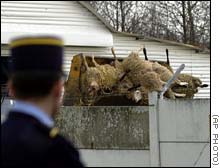March
1, 2001
| LONDON, England
-- Six new foot-and-mouth cases were confirmed in the UK on Thursday as
the livestock disease spread to Scotland and Northern Ireland. |
 |
A UK Ministry of
Agriculture spokesman told CNN 32 farms are now known have been infected.
The latest cases in Britain are at two farms in Dumfries, southern Scotland
and three in Cumbria, north west England. Another outbreak -- at South
Armagh in Northern Ireland -- was confirmed after the farm was sealed off
overnight.
Governments across
Europe have stepped up measures to prevent the highly-contagious
disease reaching their countries. France is preparing to slaughter another
30,000 sheep and Germany has admitted it will not be able to give the all-clear
until the end of March. Officials in the central German state of Hesse
said on Thursday that sheep brought to the area from one of the UK farms
infected with the virus were to be slaughtered. Checks are being introduced
on travelers from the UK in many countries including Portugal, where all
British tourists now have to douse their feet in disinfectant as they arrive.
 |
Foot-and-mouth disease affects animals
with cloven hooves such as pigs, sheep and cows. It is harmless to humans
and is not even fatal to most animals, but it destroys their economic value.
The virus can travel miles by air or on clothing or vehicle
tyres.
The farm in South
Armagh -- which |
recently imported
200 sheep from Carlisle, in north west England -- is just two miles (3.2
kilometres) from the border of the Irish Republic. The livestock industry
is a key part of the economy there. The Republic's Prime Minister, Bertie
Ahern, has expressed "huge concern" at the possibility of foot-and-mouth
so close to the border of his country. Vehicles are being disinfected at
ports and border crossings and sheep recently brought in from Britain are
being slaughtered.
France is to destroy
another 30,000 sheep which have been in contact with animals from Britain
since February 1. That is on top of a cull of 20,000 animals already announced.
Farm Minister Jean Glavany said France had yet to record any suspected
cases of food-mouth but was wary because a large number of sheep had been
imported from Britain ahead of the Muslim festival of Eid al-Adha (Feast
of the Sacrifice) on March 5.
German officials
in North Rhine-Westphalia said on Thursday they expected confirmation that
sheep from two farms, which were found to have foot-and-mouth antibodies
in their blood, had tested negative for the virus itself. But they said
they were still on their guard. Baerbel Hoehn, environment and farm minister
in the state, told German television: "Based on the incubation period,
we will be out of the woods by mid-March but we won't be able to really
relax until the end of March. March will be a problematic month."
Five farms in the
eastern state of Brandenburg, which have imported pigs from Britain, remain
under complete quarantine. All livestock markets and auction grounds in
Germany were closed for a week from Wednesday. The Netherlands and Belgium
have also ordered the slaughter of animals linked to UK farms. Travellers
from Britain are being told at some European airports and ports to surrender
any food from home or bought in transit in case it carries the virus. In
Portugal disinfectant foot baths are being installed at all border posts
for passengers arriving from the UK.
The British government
has brought in sweeping measures to try to contain the foot-and-mouth outbreak.
Prime Minister Tony Blair introduced fines of up to £5,000 ($7,200)
to ensure people observed the no-go status imposed on large tracts
of rural Britain. Chief Veterinary Officer Jim Scudamore said on Thursday
he expected more cases to emerge. "These are all linked to a large extent
with movements that took place before we put the complete ban (on livestock
movements) on the 23rd February," he told BBC radio. He said officials
were currently assessing whether it would be necessary to cull wildlife
to prevent foxes and deer spreading the disease.
A worldwide ban on
British livestock and animal products is in force, costing the country
£8 million ($12 million) a week in lost sales.